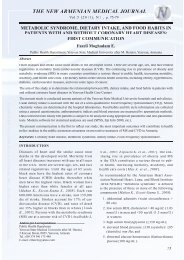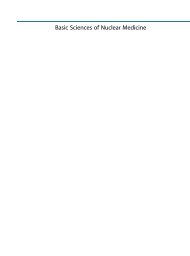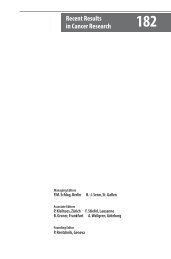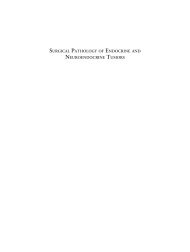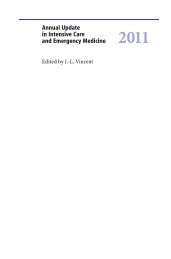Acute Leukemias - Republican Scientific Medical Library
Acute Leukemias - Republican Scientific Medical Library
Acute Leukemias - Republican Scientific Medical Library
Create successful ePaper yourself
Turn your PDF publications into a flip-book with our unique Google optimized e-Paper software.
176 Chapter 13 · Treatment of Adult ALL According to Protocols of the German Multicenter Study Group for Adult ALL (GMALL)<br />
9. Arnold R, Beelen D, Bunjes D, et al. (2003) Phenotype predicts outcome<br />
after allogeneic stem cell transplantation in adult high risk<br />
ALL patients. Blood 102:(abstr #1719)<br />
10. Ottmann OG, Druker BJ, Sawyers CL, et al. (2002) A phase II study<br />
of imatinib mesylate (Glivec) in patients with relapsed or refractory<br />
Philadelphia chromosome-positive acute lymphoid leukemias.<br />
Blood 100:1965–1971<br />
11. Wassmann B, Pfeifer H, Scheuring U, et al. (2002) Therapy with imatinib<br />
mesylate (Glivec) preceding allogeneic stem cell transplantation<br />
(SCT) in relapsed or refractory Philadelphia-positive acute<br />
lymphoblastic leukemia (Ph+ALL). Leukemia 16:2358–2365<br />
12. Scheuring UJ, Pfeifer H, Wassmann B, et al. (2003) Early minimal<br />
residual disease (MRD) analysis during treatment of Philadelphia<br />
chromosome/Bcr-Abl-positive acute lymphoblastic leukemia with<br />
the Abl-tyrosine kinase inhibitor imatinib (STI571). Blood 101:85–<br />
90<br />
13. Wassmann B, Pfeifer H, Gökbuget N, et al. (2006) Alternating versus<br />
concurrent schedules of Imatinib and chemotherapy as frontline<br />
therapy for Philadelphia-positive acute lymphoblastic leukemia<br />
(Ph+ALL). Blood 108:1469–1477<br />
14. Wassmann B, Pfeifer H, Stadler M, et al. (2005) Early molecular response<br />
to posttransplantation imatinib determines outcome in<br />
MRD+ Philadelphia-positive acute lymphoblastic leukemia (Ph+<br />
ALL). Blood 106:458–463<br />
15. Gökbuget N, de Wit M, Gerhardt A, et al. (2000) Results of a shortened,<br />
dose reduced treatment protocol in elderly patients with<br />
acute lymphoblastic leukemia (ALL). Blood 96:3104a(abstr)<br />
16. Ottmann OG, Wassmann B, Pfeifer H, et al. (2007) Imatinib compared<br />
with chemotherapy as front-line treatment of elderly patients<br />
with Philadelphia chromosome-positive acute lymphoblastic<br />
leukemia (Ph+ALL). Cancer 109:2068–2076<br />
17. Hofmann WK, de Vos S, Elashoff D, et al. (2002) Relation between<br />
resistance of Philadelphia-chromosome-positive acute lymphoblastic<br />
leukaemia to the tyrosine kinase inhibitor STI571 and<br />
gene-expression profiles: A gene-expression study. Lancet 359:<br />
481–486<br />
18. Pfeifer H, Wassmann B, Pavlova A, et al. (2007) Kinase domain mutations<br />
of BCR-ABL frequently precede imatinib-based therapy<br />
and give rise to relapse in patients with de novo Philadelphia-positive<br />
acute lymphoblastic leukemia (Ph+ ALL). Blood 110:727–734<br />
19. Hoelzer D, Ludwig W-D, Thiel E, et al. (1996) Improved outcome in<br />
adult B-cell acute lymphoblastic leukemia. Blood 87:495–508<br />
20. Hoelzer D, Arnold R, Diedrich H, et al. (2002) Successful treatment<br />
of Burkitt’s NHL and other high-grade NHL according to a protocol<br />
for mature B-ALL. Blood 100:159a(abstr 595)<br />
21. Hoelzer D, Baur K-H, Giagounidis A, et al. (2003) Short intensive<br />
chemotherapy with rituximab seems successful in Burkitt NHL,<br />
mature B-ALL and other high-grade B-NHL. Blood 102:(abstr 236)<br />
22. Hoffmann C, Wolf E, Wyen C, et al. (2006) AIDS-associated Burkitt<br />
or Burkitt-like lymphoma: Short intensive polychemotherapy is<br />
feasible and effective. Leuk Lymphoma 47:1872–1880<br />
23. Thiel E, Hoelzer D, Dörken B, et al. (1987) Clinical relevance of blast<br />
cell phenotype as determined with monoclonal antibodies in<br />
acute lymphoblastic leukemia of adults. Haematol Blood Transf<br />
30:95–103<br />
24. Bene MC, Castoldi G, Knapp W, et al. (1995) Proposal for the immunological<br />
classification of acute leukemias. Leukemia 9:1783–<br />
1786<br />
25. Ludwig WD, Raghavachar A, Thiel E (1994) Immunophenotypic<br />
classification of acute lymphoblastic leukemia. Bailliere’s Clin Haematol<br />
7(2):235<br />
26. Thiel E, Kranz BR, Raghavachar A, et al. (1989) Prethymic phenotype<br />
and genotype of pre-T(CD+/ER–)-cell leukemia and its clinical<br />
significance within adult acute lymphoblastic leukemia. Blood<br />
73:1247–1258<br />
27. Hoelzer D, Arnold R, Freund M, et al. (1999) Characteristics, outcome<br />
and risk factors in adult T-lineage acute lymphoblastic leukemia<br />
(ALL). Blood 94:2926a<br />
28. Ludwig WD (1996) Immunophenotypic features of childhood and<br />
adult acute lymphoblastic leukemia (ALL): experience of the German<br />
Multicentre Trials ALL-BFM and GMALL. Leuk Lymphoma<br />
13:71<br />
29. Gleissner B, Gökbuget N, Rieder H, et al. (2005) CD10-negative<br />
pre-B acute lymphoblastic leukemia (ALL): A distinct high-risk subgroup<br />
of adult ALL associated with a high frequency of MLL aberrations.<br />
Results of the German Multicenter Trials for Adult ALL<br />
(GMALL). Blood 106:4054–4056<br />
30. Gleissner B, Gökbuget N, Bartram CR, et al. (2002) Leading prognostic<br />
relevance of the BCR-ABL translocation in adult acute Blineage<br />
lymphoblastic leukemia: A prospective study of the German<br />
Multicenter Trial Group and confirmed polymerase chain reaction<br />
analysis. Blood 99:1536–1543<br />
31. Burmeister T, Gökbuget N, Reinhardt R, et al. (2006) NUP214-ABL1<br />
in adult T-ALL: The GMALL study group experience. Blood<br />
108:3556–3559<br />
32. Burmeister T, Marschalek R, Schneider B, et al. (2006) Monitoring<br />
minimal residual disease by quantification of genomic chromosomal<br />
breakpoint sequences in acute leukemias with MLL aberrations.<br />
Leukemia 20:451–457<br />
33. Baak U, Burmeister T, Gökbuget N, et al. (2004) Prognostic impact<br />
of the expression of the TLX1 (HOX11) and TLX3 (HOX11L2) oncogenes<br />
in adult ALL: Experience of the German Multicenter<br />
<strong>Acute</strong> Lymphoblastic Leukemia (GMALL) Therapy Study Group.<br />
Session Type: Poster Session 229-I. Blood 104:#1075<br />
34. Baldus CD, Burmeister T, Martus P, et al. (2006) High expression of<br />
the ETS transcription factor ERG predicts adverse outcome in<br />
acute T-lymphoblastic leukemia in adults. J Clin Oncol 24:4714–<br />
4720<br />
35. Baldus CD, Martus P, Burmeister T, et al. (2007) Low ERG and<br />
BAALC expression identifies a new subgroup of adult acute T-lymphoblastic<br />
leukemia with a highly favorable outcome. J Clin Oncol<br />
(accepted)<br />
36. Bruggemann M, Raff T, Flohr T, et al. (2006) Clinical significance of<br />
minimal residual disease quantification in adult patients with<br />
standard-risk acute lymphoblastic leukemia. Blood 107:1116–<br />
1123<br />
37. Raff T, Gökbuget N, Luschen S, et al. (2007) Molecular relapse in<br />
adult standard-risk ALL patients detected by prospective MRD<br />
monitoring during and after maintenance treatment: Data from<br />
the GMALL 06/99 and 07/03 trials. Blood 109:910–915<br />
38. Gökbuget N, Raff R, Brugge-Mann M, et al. (2004) Risk/MRD<br />
adapted GMALL trials in adult ALL. Ann Hematol 83(Suppl 1):<br />
S129–S131<br />
39. Gökbuget N, Hoelzer D (2006) Treatment of adult acute lymphoblastic<br />
leukemia. Hematology Am Soc Hematol Educ Program<br />
1:133–141



